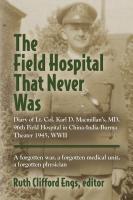| ||||||||||||||||
| Category: History |
(requires Adobe Reader)
|
| About the Book | |
|
A FORGOTTEN WAR, A FORGOTTEN MEDICAL UNIT, A FORGOTTEN PHYSICIAN Lt. Col. (later Col) Karl D. MacMillan’s, MD, diary provides vivid impressions and observations as commanding officer of the US Army’s 96th Field Hospital in the last year of World War II. This mobile hospital in the almost forgotten CBI Theater has essentially been lost to history. Thus the purpose of this work is to bring to life the 96th Field Hospital and MacMillan’s experiences. The field hospital was organized October 1944 at Camp Barkley, TX. In December, MacMillan, an ophthalmologist, was made commander of the unit. The diary begins with his deployment across the Pacific February 7, 1945 and his experiences on the Navy troopship “USS General A. Mann,” to India. It continues with travel by rickety train and then vehicle convoy through Burma and into China over the treacherous Ledo-Burma Road. In anticipation of an invasion of Japan during the autumn of 1945 and treatment of a half million potential war casualties, the field hospital’s destination was China. In order to keep American and Chinese troops healthy, mobile units such as field hospitals, also needed to pay attention to public health measures as part of the Army Medical Service mission. As MacMillan and the unit slog through mud and monsoons over the rough terrain their primary battles were against poor personal hygiene, sanitation, road accidents, and virulent tropical diseases. Tropical diseases including scrub typhus, schistosomiasis, cholera, and amebic dysentery, never seen by most of the American Army physicians, affected most units in the theater including the Chinese troops. These diseases were often difficult to prevent or treat. Throughout MacMillan’s diary, he mentions preventive measures to keep his, and nearby units, healthy. The troops took daily doses of Atabrine and used mosquito nets or “bars” to prevent malaria infections. The medical unit gave immunizations against plague, cholera, and typhoid fever. Sexually transmitted diseases were rampant among local women and the American troops with whom they consorted. It was an ongoing struggle to find and maintain clean latrines, reduce disease carrying insects, and to prevent vehicle accidents on the rough Ledo-Burma, Burma, and other roads. MacMillan’s diary, reflecting his attention to detail and interest in anthropology, geography and other scientific disciplines, captures the essence of both the physical difficulty of the journey and his daily leadership challenges. When they arrived in Kunming, China, to set up the field hospital, they found it was not needed and sent to Liuchow and then to Shanghai, China. Confusion reigned as the field hospital was depleted to provide personnel to war-weary units. Some levity is found in his detailed descriptions of meals and shopping trips for exotic East Asian goods. Fascinating descriptions of the terrain, flying “over the Hump,” Chinese villages, and interesting characters, both within his unit and those met on the road, add to the diary’s interest. This work provides a unique insight into MacMillan and the many challenges he faced during the winding down of the Second World War.
|
|
| About the Author | |
 |
Dr. Ruth Clifford Engs, professor emeritus, School of Public Health, Indiana University, Bloomington has authored or edited 12 academic books and numerous articles. Book examples include Unseen Upton Sinclair: Nine unpublished…Works (2009) and The Eugenics Movement (2005) which was awarded the College & Research Libraries Selected Reference Works, 2005-2006. |

